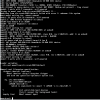So I started upgrading my 11.2-RELEASE to 12.0-RELEASE...
There were no errors during the upgrade.
Everything went well until the first reboot.
Now when the server boots it doesn't find a bootable partition.
It looks as if the disks are empty with no boot loader.
I downloaded a 12.0 iso and booted from it.
From there I can do a gpart show and see the partitions, but I have no idea where to go from here.
I don't have a complete backup, so I'm not very cocky.
As you can see on the attached picture ada2 is my boot disk. It's an SSD with ZFS.
BIOS is set to UEFI boot.
Please help!
There were no errors during the upgrade.
Everything went well until the first reboot.
Now when the server boots it doesn't find a bootable partition.
It looks as if the disks are empty with no boot loader.
I downloaded a 12.0 iso and booted from it.
From there I can do a gpart show and see the partitions, but I have no idea where to go from here.
I don't have a complete backup, so I'm not very cocky.
As you can see on the attached picture ada2 is my boot disk. It's an SSD with ZFS.
BIOS is set to UEFI boot.
Please help!




